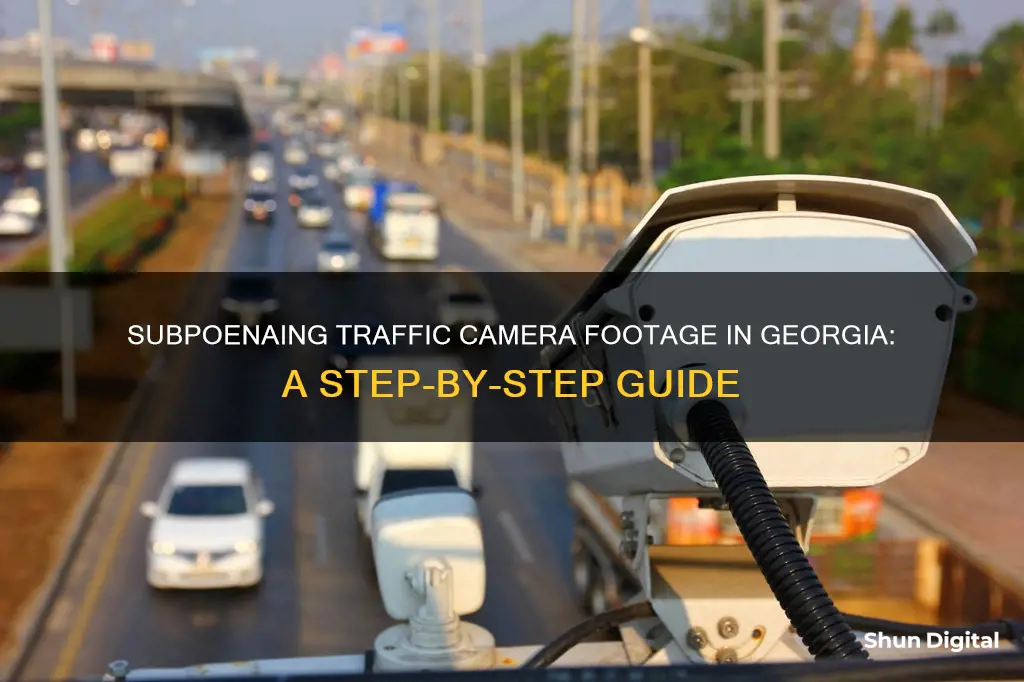
Traffic camera footage can be crucial in determining liability in car accidents. While Georgia has an extensive network of traffic cameras, the Georgia Department of Transportation (DOT) does not record footage from these cameras, making it challenging to obtain this evidence directly from the state. However, there are alternative sources of footage that can be valuable in building a case. This includes private business surveillance videos, home security camera footage, and personal dash camera recordings. To access this evidence, it is essential to act quickly before the footage is deleted. Engaging the services of a lawyer can be beneficial in navigating the process of obtaining this evidence and building a strong case.
| Characteristics | Values |
|---|---|
| Traffic camera footage availability in Georgia | No footage available from the Georgia Department of Transportation (DOT) cameras. |
| Purpose of Georgia's traffic camera network | Monitoring traffic flow |
| Access to live traffic camera footage | Available on smartphones or computers via Georgia 511, a DOT traffic service |
| Storage of traffic camera footage | Not stored due to massive storage requirements and cost-prohibitive manpower |
| Alternatives to DOT traffic camera footage | Home security cameras, dash cams, surveillance videos from nearby businesses |
| Obtaining footage from other sources | Contact homeowners or businesses directly; check with witnesses for dash cam footage |
| Additional evidence sources | Georgia DPS' EPORTS system for crash reports, incident reports, photos, and dashcam videos |
| Requesting footage from Georgia DPS | Submit a request to the Georgia DPS Open Records Unit with relevant details |
| Fee for requesting footage | May require a fee |
| Timeliness of requesting footage | Critical due to potential deletion of footage and witness memory loss |
What You'll Learn

Requesting footage from the Georgia Department of Transportation
While it is possible to view a live stream of traffic camera footage in Georgia on your smartphone or computer, the Georgia Department of Transportation (DOT) does not record this footage. This means that the DOT cannot provide traffic camera footage upon request.
However, there are alternative ways to obtain footage of a road accident in Georgia. For example, you can request footage from private businesses and homeowners with security cameras. If you are involved in a road accident, it is important to act quickly, as security footage is often stored for a limited time before being erased.
Another option is to contact the local police and request dashcam footage from police vehicles. You can also check if there are any traffic cameras at the location of the accident using a traffic camera map, such as the one provided by PhotoEnforced.com. To obtain footage from these cameras, you will need a court-ordered subpoena. Keep in mind that not all cameras at intersections record footage, and some may only be there to manage traffic signals.
If you are seeking footage to support an insurance claim or legal case, it is recommended to consult a lawyer, who can guide you through the process and help you navigate any complexities.
Recenter Your Modo Render Camera: Quick Guide
You may want to see also

Obtaining footage from private businesses
If you are unable to obtain traffic camera footage, private surveillance cameras do exist and can be preserved. Businesses and local shops located on busy streets may have cameras that recorded the accident. This footage is stored for a reasonable period before it is erased and can be accessed through the business owner. Banks, stores, and other businesses near the accident scene could have caught the incident. It is important to get to the business before it deletes the footage.
Footage from private businesses can be accessed and used as evidence against the other driver with the help of attorneys. It is important to act quickly, as critical evidence disappears with each passing day.
The Craft of Camera Bag Making
You may want to see also

Home security camera footage
If you are seeking footage from a homeowner's security camera, the process is slightly different from obtaining footage from businesses or government agencies. In most cases, the police will need a warrant or court order to confiscate or access your home security camera footage. This is due to the Fourth Amendment, which protects citizens against unreasonable government searches and seizures without warrants based on probable cause.
However, there are some exceptions to this rule. If officers can view footage from a public space with no privacy rights, they may be able to access those images directly from your system without a warrant. Additionally, if an immediate crisis or emergency situation requires a rapid response, officers can legally access your camera feed without a warrant under the exigent circumstances exception.
If you are requesting footage from a homeowner, it is essential to follow the proper procedures. First, confirm the legitimacy of the request by asking the officer to provide details and explain the reasons for needing the footage. If you are unsure about the legality of the request, consult with an attorney before proceeding. It is also important to document the request details, including the date, names of officers, badge numbers, and direct contact information. Once you have confirmed the legitimacy of the request and understood the protocols, cooperate politely and provide only the specific footage relevant to the incident.
It is worth noting that obtaining traffic camera footage in Georgia can be challenging. The Georgia Department of Transportation (DOT) does not record videos from traffic cameras, so they cannot honour requests for this type of footage. However, you can still view live streams of these traffic cameras via Georgia 511, a DOT traffic service. This live stream can be accessed on smartphones or computers and can provide valuable real-time information about traffic conditions.
Consequences of Unpaid Camera Tickets in Newburgh Heights
You may want to see also

Personal dash cameras
Firstly, the placement of dash cams is important. According to Georgia Code § 40-8-73, it is illegal to drive with any non-transparent material on the front windshield, side windows, or rear windows that obstruct the driver's clear view of the highway or any intersecting highway. Therefore, dash cams should not be mounted on the windshield, and instead placed on the dashboard or behind the rear-view mirror.
Secondly, if your dash cam records audio, you must obtain consent from everyone in the vehicle before recording their voices. This is because Georgia is a two-party consent state, which means that all parties involved in a conversation must give their consent to be recorded.
Additionally, it is important to note that dash cam footage can be used as evidence in court. If there is evidence of a crime and a police officer or someone involved in the case subpoenas your dash cam footage, you must provide it. If you refuse or delete the video, you could face fines or even jail time. On the other hand, if you are involved in an accident, your own dash cam footage can be used against you by the other party.
Overall, personal dash cameras can be a valuable tool in capturing important footage, but it is essential to be aware of the legal restrictions and implications of using them.
Charging Your Coolpix S51: A Step-by-Step Guide
You may want to see also

Police reports and accident reports
When it comes to traffic camera footage specifically, the process can be more challenging. In Georgia, for example, the state's Department of Transportation does not record traffic camera footage, which can be frustrating for those seeking video evidence of an accident. However, alternative sources of footage may be available, such as private business surveillance videos, home security camera footage, or personal dash camera recordings. Obtaining this footage typically involves contacting the owners of the cameras directly and requesting their cooperation.
In some cases, a subpoena may be necessary to obtain video evidence. A subpoena is a court order requiring the owner of the camera to provide their surveillance footage. To obtain a subpoena, you must first file a lawsuit against the other driver involved in the accident. Then, with the help of an experienced car accident lawyer, you can make the courts aware of any relevant surveillance footage. The court will then issue a subpoena to the camera's owner, compelling them to turn over the requested footage.
It is important to act quickly when requesting video evidence, as security camera footage is often deleted or overwritten regularly. Sending a preservation letter to the owner of the camera can help ensure that the footage is not deleted before you have a chance to obtain it. This letter should include the details of the accident, such as the date, time, and location, as well as a formal request to preserve the relevant footage.
While the process of obtaining traffic camera footage and police reports can be complex, several sources of evidence are available to support your case. These may include eyewitness testimony, dash camera footage, and alternative surveillance camera footage from nearby businesses or residences. Working with a knowledgeable car accident lawyer can help you navigate the process and improve your chances of obtaining the evidence you need to prove your case.
Fight Traffic Tickets: Camera Evidence in Illinois
You may want to see also
Frequently asked questions
The Georgia Department of Transportation (DOT) does not record traffic camera footage, so you cannot obtain it from them. However, you can try to access footage from other sources, such as private businesses, home security cameras, or personal dash cameras.
The retention period for traffic camera footage varies. In some cases, footage may be kept for as little as 14 days, while in others, it may be retained for up to 30 days or two weeks to a month. It is recommended to request the footage as soon as possible.
To subpoena traffic camera footage in Georgia, you will need to obtain a court-ordered subpoena. First, identify the owner of the camera, which could be the DOT, the city, the county, a local municipality, a news station, or a private company. Then, contact the owner and submit your subpoena request. You may also want to consult an attorney for assistance in this process.







